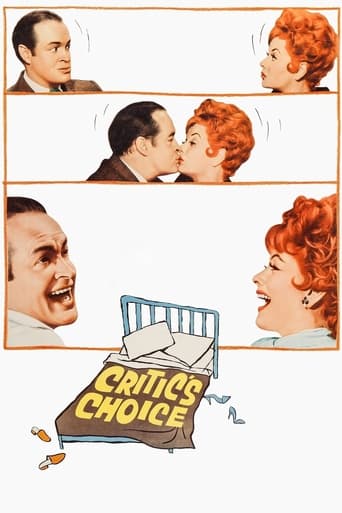classicsoncall
The only recommendation I can think of for this film is the chance to see Bob Hope and Lucille Ball in a movie together. But putting two top tier comedians in a vehicle like this, one would expect some laughs. Instead, if there are any here they get strained through a prism of obnoxious behavior on the part of Parker Ballantine (Hope) and his wife Angie's (Ball) frustrated attempts to win him over to her play-writing endeavor. Parker's insistence to 'remain true to himself' as a theater critic fell flat with this viewer, and only managed to escalate the tension between the couple. The scene where Angie berates him in front of her Mom and sisters was just excruciating. No two ways about it, Parker was a jerk. For this viewer there were only two redeeming moments - Soupy Sales showing up as the Boston hotel desk clerk, and Jim Backus strapping Hope into his psychiatrist's couch. He should have kept him there.
edwagreen
You have some serious subject matter in this 1963 film with Lucille Ball trying desperately to get out of the kitchen and become a Broadway playwright. Trouble is that husband Bob Hope is a tough film critic who has panned his first wife's (Marilyn Maxwell) play. There is a strange relationship that Hope's son has with his mother, the Maxwell character. Apparently, she has allowed the Hope character to have full custody of the child. She is the woman where a career comes first.The film tends to go downhill near the end when a very drunken Hope causes disruption at the theater where the play is opening on opening night.Jesse Royce Landis,as Ball's mother and Rip Torn, as a Greek director,both give ample support.Lucy is not her usual Lucy here and I enjoyed her character change.
Neil Doyle
BOB HOPE and LUCILLE BALL do okay in this mild comedy about a woman (Lucy) who decides to show her theater critic hubby (Hope) that she can create a play based on her family relatives.RIP TORN is amusing as the director of Lucy's play, working on it night and day to put it into shape while Hope seethes with jealousy. Meanwhile, his ex-wife, MARILYN MAXWELL, is around often enough to keep Lucy irate enough.The friction between theater critic and playwright comes to life whenever they trade barbs. The comedy aspects fall flat once in awhile with the more serious moments given more emphasis than usual in a Bob Hope/Lucille Ball comedy.JESSIE ROYCE LANDIS does nicely as Hope's mother. This isn't the typical fare expected of Hope or Ball, but it has its moments where the plot elements have more dimension than usual in a caper of this sort.Hope has his usual one-liners."What are you trying to do--drown your troubles?" a bartender asks him."No, I'm just teaching them how to swim."
tday-1
based on a Broadway show by Ira Levin (Rosemary's Baby) author,really bizarre tale of a theater critic and his wannabe playwright wife. Bob and Lucy appeared in other films but this one was their worst. The critic doesn't even bother to stay through the plays.He leaves in the middle and goes back to office for hatchet job. He's bombed out of his mind when he sees wife's play and then destroys it in print. How unfair is that?The idea,I suppose,was to show the folly of a wife trying to leave the nest for her own career and serving hubby was all the fulfillment she needed out of life. I saw this film when I was nine and even then I thought it was unfair Lucy didn't get to have a success as a playwright. Bob seemed pompous and overbearing,like the typical hubbys in fifties and sixties films who were threatened by their wive's success.



